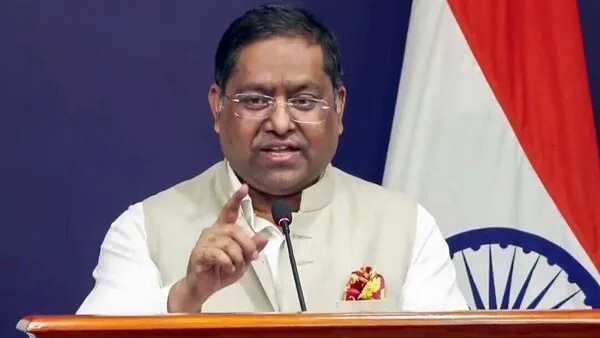
India Reacts To Saudi Arabia-Pakistan Defence Pact, Says 'Govt Remains Committed To Protecting National Interests'
MEA's remark comes hours after Saudi Arabia and Pakistan signed a“Strategic Mutual Defence Agreement”, pledging that any aggression against either nation would be treated as an attack on both.
Also Read: In fresh warning, Jaishankar reminds Pakistan of 'a man named Osama bin Laden
In a statement issued by the Ministry of External Affairs (MEA) Spokesperson Randhir Jaiswal stated that New Delhi acknowledges the formalisation of what it described as a“long-standing arrangement” between Saudi Arabia and Pakistan, while noting that it would closely examine its potential ramifications.
Jaiswal further emphasised that India's national security remains paramount in light of this development.
Also Read: Pakistani man buys ticket to Karachi, wakes up in Saudi Arabia, sues Airline: 'blamed me for the mistake'
"We have seen reports of the signing of a strategic mutual defence pact between Saudi Arabia and Pakistan. The Government was aware that this development, which formalizes a long-standing arrangement between the two countries, had been under consideration. We will study the implications of this development for our national security as well as for regional and global stability. The Government remains committed to protecting India's national interests and ensuring comprehensive national security in all domains," the statement from the MEA read.
Pakistan-Saudi Arabia defence pactThe strengthening of defence ties comes at a time when Gulf Arab states are increasingly questioning the reliability of the United States as their traditional security guarantor. These concerns have been further amplified by Israel's recent attack on Qatar, which has deepened regional anxieties and pushed some states to reconsider their strategic alliances.
Also Read: Operation Sindoor: How India carried out its 'most significant' military action inside Pakistan in 5 decades
The agreement was inked during a state visit by Pakistan Prime Minister Shehbaz Sharif on Wednesday to Riyadh at the invitation of Crown Prince and Prime Minister of Saudi Arabia Mohammed bin Salman bin Abdulaziz Al Saud.
According to a joint statement issued following the visit, "building on the historic partnership extending for nearly eight decades between the Kingdom of Saudi Arabia and the Islamic Republic of Pakistan, and based on the bonds of brotherhood and Islamic solidarity, as well as shared strategic interests and close defence cooperation between the two countries, HRH the Crown Prince and the Pakistani prime minister signed a Strategic Mutual Defence Agreement."
"This agreement, which reflects the shared commitment of both nations to enhance their security and to achieving security and peace in the region and the world, aims to develop aspects of defence cooperation between the two countries and strengthen joint deterrence against any aggression. The agreement states that any aggression against either country shall be considered an aggression against both," the joint statement further read.
Saudi-Pak relationsPakistan and Saudi Arabia have maintained a long-standing defence partnership, rooted in shared strategic and religious interests. This relationship dates back to the late 1960s, when Pakistani troops were first deployed to Saudi Arabia amid regional tensions sparked by Egypt's involvement in the Yemen war.
The alliance deepened further after Iran's 1979 Islamic Revolution , which heightened Saudi concerns over a potential conflict with Tehran. Pakistan's commitment to protecting the Islamic holy sites of Mecca and Medina has remained a key pillar of this defence cooperation.
Also Read: 'I love Pakistan': Trump drums up credit for 'stopping' Indo-Pak conflict again; compliments PM Modi as 'fantastic man'
In a 2007 U.S. diplomatic cable published by WikiLeaks, American diplomats in Saudi Arabia noted that their Pakistani counterparts had brought up the idea of the kingdom pursuing a weapons program alongside Islamabad, AP reported.
“According to these officials, they understand that (Saudi Arabia) does want to protect itself and the region, and since, in their opinion, some of the other regional players - specifically Egypt - are unable to develop such weapons systems due to financial constraints, it is logical for the Saudis to step in as the physical 'protector' just as the they have been increasingly stepping in as peace mediators in various regional conflicts,” the cable read.
Saudi Arabia has been seeking U.S. support to develop a civilian nuclear energy program, which was previously linked to a proposed normalisation deal with Israel before the October 2023 Hamas attack .
The Government remains committed to protecting India's national interests and ensuring comprehensive national security in all domains.A key concern in this effort is Riyadh's interest in enriching uranium on its own soil, a move that has raised alarms among nonproliferation experts, as the ability to spin centrifuges domestically could potentially pave the way for a future weapons program.
(With inputs from agencies)
Key Takeaways- The Saudi-Pakistan agreement formalizes a defense pact that has historical roots, highlighting evolving geopolitical alliances. India's response reflects a commitment to national security amidst regional tensions and changing power dynamics. The pact raises concerns over potential arms development and regional stability in light of current global conflicts.
Legal Disclaimer:
MENAFN provides the
information “as is” without warranty of any kind. We do not accept
any responsibility or liability for the accuracy, content, images,
videos, licenses, completeness, legality, or reliability of the information
contained in this article. If you have any complaints or copyright
issues related to this article, kindly contact the provider above.
















Comments
No comment